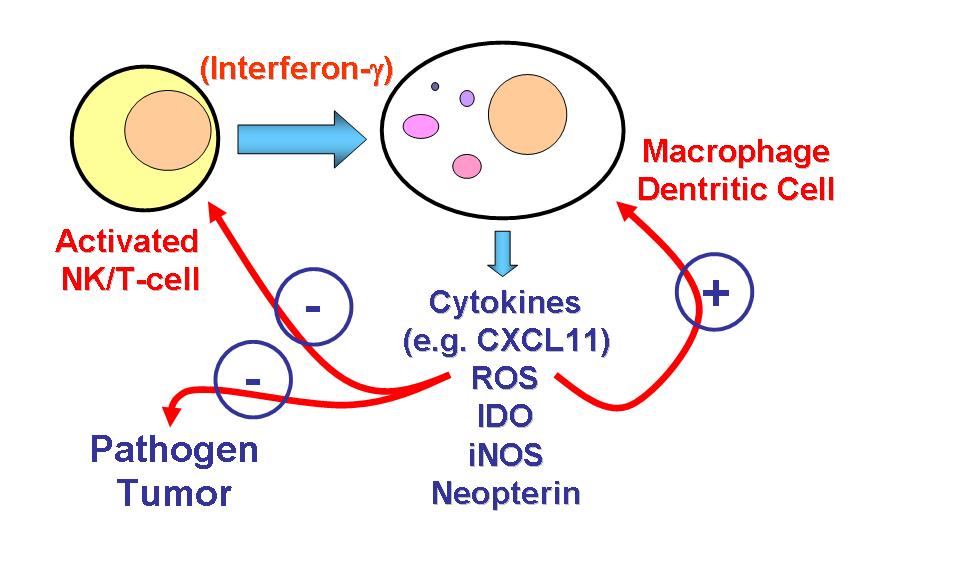Research Topics, Division of Biological Chemistry, Biocentre, Innsbruck Medical University
Related pathways and clinical relevance
In conditions leading to increased neopterin formation, i.e. activation of NK and T-cells and hence of macrophages, a number of further cytokines and metabolic pathways are induced (Figure 2). We were among the first to clone and characterize a novel small T-cell attracting CXC chemokine, i.e. CXCL11, and to show its cross-reactivity with other CXC chemokines reacting with the CXCR3 receptor and its involvement in allograft rejection (1). A metabolic pathway induced in response to T-cell activation is degradation of the essential amino acid tryptophan by indoleamine 2,3-dioxygenase (IDO). Patients with a negative prognosis have increased IDO activities in addition to increased neopterin levels in a number of conditions (2, 3). Like other pathways induced by interferon-γ, this strategy of the immune system serves to restrict growth of pathogens or malignant cells but, when getting beyond control, can also lead to immune deficiency (4), impairment of erythropoiesis and increased probability to develop depression because of affecting the serotonin/tryptophan metabolism (5). Finally there exists a potential association of subnormal tryptophan degradation and the course of allergy and asthma, as has been investigated in patients suffering from pollinosis under specific immunotherapy (6).

- Meyer M, Hensbergen PJ, Raaij-Helmer EMH, Brandacher G, Margreiter R, Heufler C, Koch F, Narumi S, Werner ER, Colvin R, Luster AD, Tensen CP, Werner-Felmayer G (2001) Cross reactivity of three T cell attracting murine chemokines stimulating the CXC chemokine receptor CXCR3 and their induction in cultured cells and in allograft rejection. Eur J Immunol 31:2521-2527
- Weinlich G, Murr C, Richardsen L, Winkler C, Fuchs D (2007) Decreased serum tryptophan concentration predicts poor prognosis in malignant melanoma patients. Dermatology 214:8-14
- Brandacher G, Schroecksnadel K, Winkler C, Margreiter R, Fuchs D (2006) Antitumoral activity of interferon-ginvolved in impaired immune function in cancer patients. Curr Drug Metabol 7:599-612
- Boasso A, Herbeuval JP, Hardy AW, Anderson SA, Dolan MJ, Fuchs D, Shearer GM (2007) HIV-1 inhibits CD4+ T cell proliferation by inducing indoleamine 2,3-dioxygenase in plasmacytoid dendritic cells. Blood 109:3351-3359
- Widner B, Laich A, Sperner-Unterweger B, Ledochowski M, Fuchs D (2002) Neopterin production, tryptophan degradation and mental depression: what is the link? Brain Behav Immun 16:590-595
- Kositz C, Schroecksnadel K, Grander G, Schennach H, Kofler H, Fuchs D (2008) Serum tryptophan concentration in patients predicts outcome of specific immunotherapy with pollen extracts. Int Arch Allergy Immunol 147:35-40



